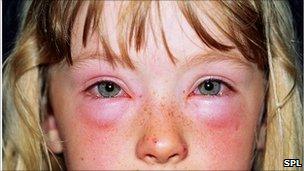Alternative allergy test offers 'mislead parents'
- Published

Swelling around the eyes can be a symptom of an allergic reaction
There is no scientific evidence that complementary therapies or kits sold through websites can identify allergies, the NHS watchdog NICE says.
It says sites for services such as hair analysis use plausible stories but are not backed up by scientific evidence.
It is publishing new guidance to help doctors in England and Wales identify when a child may have allergy problems.
NICE says some parents end up turning to alternative therapies after a perceived lack of help from their GPs.
It is estimated that one in 20 young children has a food allergy.
Dr Adam Fox, an allergy specialist based at the Evelina Children's Hospital in London, says not all children suffer immediate and obvious symptoms.
"Food allergies can actually be extremely subtle. Lots of children have eczema, colic or spit up more food than usual. For some of those children the underlying problem is an allergy to something within their diet."
The guidelines include detailed advice about how to recognise symptoms and when to refer to specialists.
Dr Fox, who helped write the guidelines for National Institute for Health and Clinical Excellence (NICE), says he often sees parents in his specialist clinic who have wasted money on complementary or alternative tests.
The review by NICE looked for any scientific research of the usefulness of approaches including hair analysis and Vega testing, which uses mild electric currents, or kinesiology, in diagnosing allergies in children.
"The websites are very well put together, the stories behind them are plausible, but we were unable to find any evidence to support them," says Dr Fox. He says there are two types of testing used in NHS clinics - skin prick and blood sample - which are backed by scientific research.
Parents' frustration
NICE is warning that parents sometimes turn to alternative tests when they have failed to convince their family doctor to listen to their concerns.
Alison Berthelson: 'The GP didn't know, he was very nervous'
It took Alison Berthelson more than two years to get an allergy diagnosis for her first son Harris. She had been to the local surgery several times when he suffered rashes and stomach upsets without any particular cause being identified.
After Harris ate a small piece of chocolate containing nuts he suffered a more extreme reaction, becoming agitated, with an extreme rash covering his entire body. The out-of-hours GP gave her son a medicine to reduce swelling, but did not send him on to hospital as an emergency.
"It was really very terrifying, terrifying at the time because we didn't know what was happening, and terrifying later when we did know what had happened and how lucky we were."
A new GP correctly diagnosed possible food allergies, and sent Harris for testing at a specialist NHS clinic. He now has to avoid nuts, sesame and some other ingredients used in prepared foods.
Allergies on rise
The number of children suffering from food allergies appears to be increasing, although experts are at a loss to understand exactly why. Family doctors are now more likely to see very young children suffering allergic reactions.
Dr Joanne Walsh, a GP involved in drafting the advice, says she now sees several children a week with suspected allergic reactions. Some are babies just a couple of weeks old.
Doctor Rosemary Leonard: "There's a real problem that people are setting themselves up as nutritionists, when they actually have no qualifications at all."
By gradually eliminating, and reintroducing different foods, she can help parents manage the allergy without the need for hospital visits. "There's nothing more rewarding than a parent coming back and saying it's like having a different child."
The Royal College of GPs welcomed the guidelines, admitting GPs have struggled to manage the increasingly common problem of food allergies.
The charity Allergy UK said it would be urging doctors to set up specialist allergy services within their surgeries to make sure parents concerned about allergic reactions are given more time than the standard GP appointment.
- Published24 June 2010